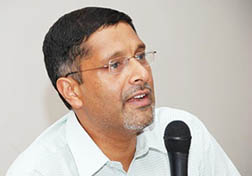
AHMEDABAD - India's Chief Economic Advisor Arvind Subramanian on Friday said that after the attack on black money through demonetisation, the country should now focus squeezing its flow. Delivered a talk on "The Surprise that is the Indian Economy" at the Indian Institute of Management, Ahmedabad, he said the need was to adopt a carrot and stick approach to prevent the flow and generation of black money.

"Black money has two dimensions. One is generating money via prohibited illegal activities and another one involves not disclosing it to tax authorities," he said, adding that there is a need to find out what exactly is in the system, high taxes or regulations, that is prompting some to conceal their income.
Subramanian again advocated implementation of Universal Basic Income (UBI) scheme in India. "There is no scientific evidence to suggest that if you give money directly to poor, they would squander it. This is more of an elitist thought process," he said. "The big advantage is that you have no leakage in this scheme." Subramanian, however, pointed out that for UBI to be implemented, other welfare schemes of the government would have to be withdrawn. "The UBI could cost anywhere around 5 per cent of the GDP and if we have to afford it, other schemes would have to go. That is the big challenge."
He asserted that despite opening of a large number of Jan Dhan accounts during the last two to three years, India was still far behind "perfect financial inclusion". "Now you have UBI where the mobile (phone) can become the real effective means of financial inclusion but the shocking statistics is that 350-400 million people in India neither have smartphones nor any phone," he said.
About the benefits of demographic dividend to India, he said the country could soon see this tapering off from 2020. "The window is closing fast and we need more migration within India as some states are ageing more than the others."
Subramanian told reporters later that the government was looking at initiating strong action on banks' bad debts.
"There has been a recognition that one of the major challenges of the macro-economy is the twin balance sheet problem. Many firms have unsustainable debt and that in turn affects the banks and hence both the balance sheets have debts. It is having an effect on the economy in terms of reducing private investment and growth. I think in the months to come, the government will take some good, strong action against this problem," he added.
Subramanian again advocated implementation of Universal Basic Income (UBI) scheme in India. "There is no scientific evidence to suggest that if you give money directly to poor, they would squander it. This is more of an elitist thought process," he said. "The big advantage is that you have no leakage in this scheme." Subramanian, however, pointed out that for UBI to be implemented, other welfare schemes of the government would have to be withdrawn. "The UBI could cost anywhere around 5 per cent of the GDP and if we have to afford it, other schemes would have to go. That is the big challenge."
He asserted that despite opening of a large number of Jan Dhan accounts during the last two to three years, India was still far behind "perfect financial inclusion". "Now you have UBI where the mobile (phone) can become the real effective means of financial inclusion but the shocking statistics is that 350-400 million people in India neither have smartphones nor any phone," he said.
About the benefits of demographic dividend to India, he said the country could soon see this tapering off from 2020. "The window is closing fast and we need more migration within India as some states are ageing more than the others."
Subramanian told reporters later that the government was looking at initiating strong action on banks' bad debts.
"There has been a recognition that one of the major challenges of the macro-economy is the twin balance sheet problem. Many firms have unsustainable debt and that in turn affects the banks and hence both the balance sheets have debts. It is having an effect on the economy in terms of reducing private investment and growth. I think in the months to come, the government will take some good, strong action against this problem," he added.

 RSS Feed
RSS Feed
